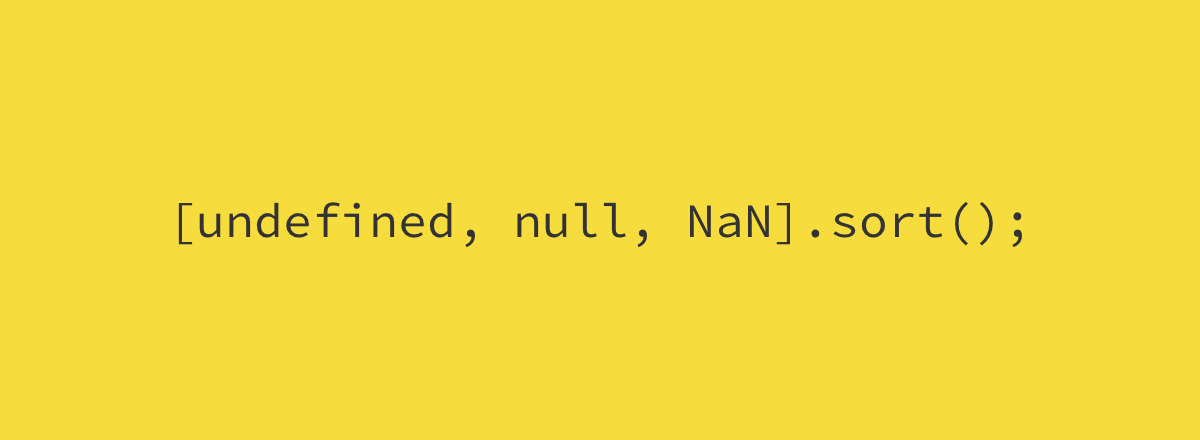Array sorting is one of those things you don't spend too long thinking about, until it stops working for you. Recently I was working with array of items in JavaScript that were not sorting at all properly and completely messing up an interface. It took me way too long to work out what went wrong so I wanted to share what happened and why it was so weird.
Basic sorting
JavaScript has a sort method available on Array objects and running it will probably do what you expect. For example:
const stringArray = ['cat', 'dog', 'ant', 'butterfly'];
stringArray.sort();
// => [ 'ant', 'butterfly', 'cat', 'dog' ]It's even pretty good if you're sorting arrays that might have members that are undefined. MDN says that "all undefined elements are sorted to the end of the array.".
const stringArrayWithUndefined = [
'cat',
undefined,
'dog',
undefined,
'ant',
'butterfly',
'zebra'
];
stringArrayWithUndefined.sort();
// => [ 'ant', 'butterfly', 'cat', 'dog', 'zebra', undefined, undefined ]Gotchas
The first issue you might come across is if you find yourself with an array containing null.
const stringArrayWithUndefinedAndNull = [
'cat',
undefined,
'dog',
undefined,
'ant',
null,
'butterfly',
'zebra'
];
stringArrayWithUndefinedAndNull.sort();
// => [ 'ant', 'butterfly', 'cat', 'dog', null, 'zebra', undefined, undefined ]Sorting will coerce the null to the string "null" which will appear somewhere in the middle of the alphabet.
Then there are numbers. The default JavaScript sorting algorithm is to convert all members of an array to strings and then compare their sequences of UTF-16 code unit values. This works great for arrays of strings as we've already seen, but it breaks down very quickly for numbers.
const numberArray = [5, 3, 7, 1];
numberArray.sort();
// => [ 1, 3, 5, 7 ]
const biggerNumberArray = [5, 3, 10, 7, 1];
biggerNumberArray.sort();
// => [ 1, 10, 3, 5, 7 ]In the example above, 10 gets sorted to before 3 because "10" is sorted before "3".
We can fix this by providing JavaScript a comparison function to use to perform the sort. The function receives two items from the array and it needs to return a numeric value and whether that value is above, below or equal to zero defines how the items are sorted relative to each other. If the return value is less than zero, then the first item is sorted in front of the second, if the value is above zero then the second item is sorted in front of the first. If the return value is 0 then the items stay in the same order with respect to each other.
To sort numbers in ascending order, the comparison function is relatively simple:
const compareNumbers = (a, b) => a - b;Subtracting the first item from the second one satisfies the requirements above. Using this comparison function with our biggerNumberArray from earlier will sort the numbers correctly.
biggerNumberArray.sort(compareNumbers);
// => [ 1, 3, 5, 7, 10 ]This still works if you have undefined elements as they are ignored and sorted to the end.
const numberArrayWithUndefined = [5, undefined, 3, 10, 7, 1];
numberArrayWithUndefined.sort(compareNumbers);
// => [ 1, 3, 5, 7, 10, undefined ]null causes problems again though.
const numberArrayWithUndefinedAndNull = [5, undefined, 3, null, 10, 7, 1];
numberArrayWithUndefinedAndNull.sort(compareNumbers);
// => [ null, 1, 3, 5, 7, 10, undefined ]This happens because coercing null to a number returns 0.
Number(null);
// => 0You could handle this in your compareNumbers function or be happy that it is consistent.
Inconsistent gotchas
The biggest problem, and this caught me out recently, comes when undefined sneaks in another way. As we've seen, if the array contains undefined it's ignored and just sorted to the back. However, if you are sorting objects where the keys may be undefined this automatic sorting doesn't happen and the results become inconsistent.
For example, if you have an array of objects where some of them have values and some don't, trying to sort by that value will not give you the result you want.
const objectArray = [
{ value: 1 },
{ value: 10 },
{},
{ value: 5 },
{ value: 7 },
{ value: 3 }
];
const compareObjects = (a, b) => a.value - b.value;
objectArray.sort(compareObjects);
// => [ { value: 1 },
// { value: 10 },
// {},
// { value: 3 },
// { value: 5 },
// { value: 7 } ]Subtracting a number from undefined or subtracting undefined from a number both return NaN and since that doesn't lay on the scale of numbers that sort needs from the comparison function the results end up a little strange. In this case, the item that caused the problem stays where it started in the array and the other objects are locally sorted.
There are a few ways around this, but the important thing is knowing that it can happen. In my case when I came across this, I filtered out the items that didn't have a value as they weren't important until they did.
objectArray
.filter(obj => typeof obj.value !== 'undefined')
.sort(compareObjects);
// => [ { value: 1 },
// { value: 3 },
// { value: 5 },
// { value: 7 },
// { value: 10 } ]Beware sorting
The upshot of all of this is that the sort function is not as straightforward as it might seem. Strings work, numbers need some input and while undefined is handled as a primitive you have to keep an eye on coercing nulls or undefined object values.
Have you come across problems sorting in JavaScript or other languages? I'd love to hear your stories too, so give me a shout on Twitter at @philnash.
